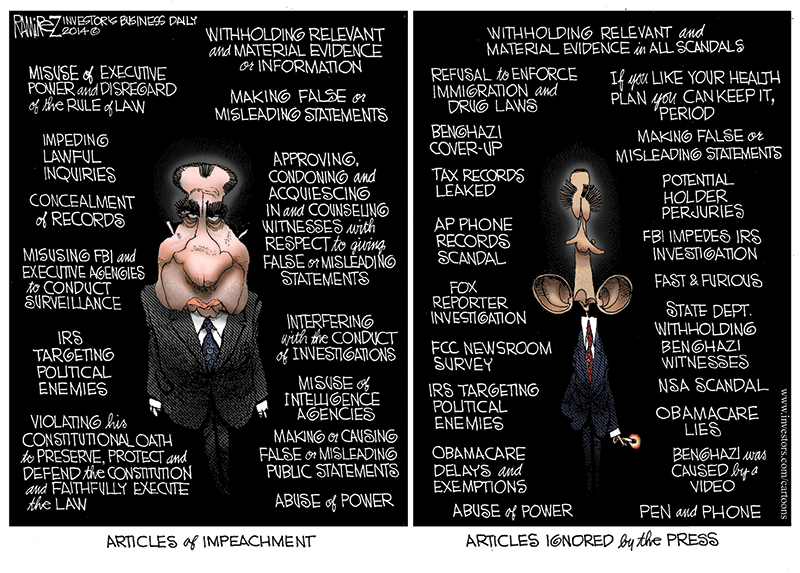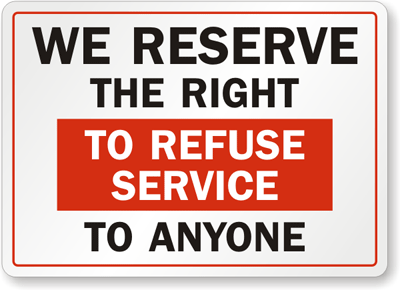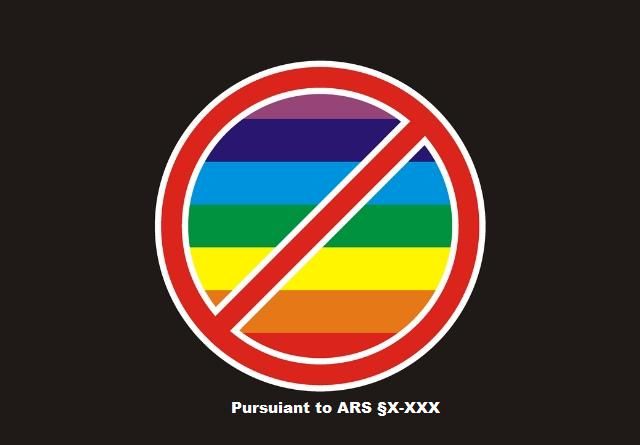I’ve been saving links for just a few weeks for this piece, and – once again – it’s been like drinking from a fire hose trying to select the best (worst?) out of the stream.
Let us begin with the oft-repeated quote from Atlas Shrugged:
There is no way to rule innocent men. The only power any government has is to crack down on criminals. When there aren’t enough criminals, one makes them. One declares so many things to be a crime that it becomes impossible for men to live without breaking the law. Create a nation of lawbreakers and then you can cash in on the guilt. Now that’s the system!
The Heritage Foundation reports that there are now so many federal criminal laws, no one knows just exactly how many there are:
Two objections to the current state of federal law have been that no one knows how many federal crimes there are, and no one can easily find them all. Heritage and others have encouraged Congress to direct the executive branch to compile a list of all federal offenses and to make that list readily accessible to the average person without charge. Recently, the Senate Judiciary Committee took a positive step toward that goal.
The American legal system has always presumed—often incorrectly—that every person knows every criminal law. In fact, no one—no police officer, no prosecutor, no judge, and no law professor—knows all of them. One reason why this problem has existed is that there is no compendium of all federal criminal laws that a person—or a lawyer—could turn to when issues arise.
In the past the Justice Department and the American Bar Association (ABA) separately attempted to prepare a list of federal offenses. Neither the Justice Department nor the ABA succeeded, no other component of the executive branch has picked up the baton since then, and no comprehensive, easily accessible list exists today.
If you have ten thousand regulations you destroy all respect for the law.
— Winston Churchill
Attorney Harvey Silverglate believes there are enough that pretty much everyone unwittingly commits Three Felonies a Day.
I’ve been writing about abuses of our “justice” system (it’s a legal system – very little “justice” gets done, and that generally by accident) almost since I started this blog. Here are some recently bookmarked news stories:
Video Shows Officer Confronting Man Filming Arrests In Towson (MD)
Meghan McCorkell reports Baltimore County police officials say they are concerned by the video and they’ve launched an investigation.
Early Sunday morning, a man videotaped as Baltimore County Police arrested two people in Towson. As the video rolled, he was confronted by an officer.
“I’m allowed to do this,” he told the officer.
“Get it out of my face,” the officer replied.
“I have my rights,” the man said.
“You have no rights,” the officer said.
But the man didn’t stop rolling and was once again aggressively approached.
“Do you see the police presence here? Do you see us all? We’re not [expletive] around. Do you understand? Do not disrespect us and do not not listen to us,” the officer said. “Now walk away and shut your [expletive] mouth or you’re going to jail, do you understand?”
“You have no rights.”
From a cop.
Next!
Family Says Moore Police Beat Father To Death (OK)
Nair Rodriguez and her daughter Lunahi told News 9 they got into an argument at the Warren Theater around midnight. Nair said she slapped her daughter then stormed away. Her husband, Luis, chased after her. That was when the family said officers confronted Luis Rodriguez and asked to see his identification.
According to Lunahi and Nair, he tried to bypass the officers to stop his wife from driving off because she was so angry. They said officers took him down and it escalated.
Lunahi Rodriguez said that five officers beat her father to death right in front of her, in the parking lot of the movie theater.
“When they flipped him over you could see all the blood on his face, it was, he was disfigured, you couldn’t recognize him.”
By the time it was all over, Nair Rodriguez said that she knew her husband was dead.
NEXT!
Dashboard cam catches cops in unbelievable series of lies that led to man’s false arrest (NJ)
Police charged a New Jersey man with resisting arrest and assaulting an officer, but recently revealed footage from a dashboard camera told a different story: Not only did the officers start beating the man for no apparent reason, but they actually crashed one of their vehicles into the man’s car.
Then they allegedly lied about what transpired and suppressed the evidence, but were somehow found innocent during an internal investigation.
Prosecutors, however, dropped all charges against 30-year-old Marcus Jeter, a black man, once they saw the incredible video footage, which fully corroborates Jeter’s side of the story.
NEXT!
What’s in a name? For the wrong Cody Williams, 35 days in jail (FL)
They arrested the wrong Cody Williams, and then kept him in jail for more than a month.
The Clay County, Fla., Sheriff’s Office punished a deputy Tuesday for the wrongful arrest of 18-year-old Cody Lee Williams, who didn’t even share the same middle name as a man accused of having sex with a young girl.
“Other than the name, there’s no other similarities,” Kris Nowicki, Cody Lee Williams’ attorney, told the Los Angeles Times on Tuesday. “Cody Williams had never met this girl and didn’t know anything about her.”
OK, that’s a (very) few representatives of the front-line enforcers (and I won’t even touch on “asset forfeiture” in this piece), but they’re the kind of thing that inspires this:

Now, let’s move up the chain.
Leawood couple battle to open police investigation records
Public records never meant a lot to Robert and Adlynn Harte — until police raided their upscale Leawood home two years ago.
The failed search for marijuana set the Hartes on a yearlong crusade for documents to shed light on what led to a search likened to a military operation that produced no charges or evidence.
The Hartes spent $25,000 working to get the records.
Now they’re lobbying the Kansas Legislature to make it easier to get at such records.
“We’re accidental activists,” Adlynn Harte said.
—
Kansas is the only state in the country that keeps such documents from public view, say open-records advocates who argue for more transparency on the activities of police and prosecutors.
—
“How can we possibly judge whether law enforcement and the courts are doing their job,” Kansas Press Association executive director Doug Anstaett said in an email, “if we have no access to the information that would help us form that opinion?”
Just last year, Glenn Reynolds wrote a Columbia Law Review piece, Ham Sandwich Nation: Due Process When Everything Is a Crime that begins thus:
Prosecutorial discretion poses an increasing threat to justice. The threat has in fact grown more severe to the point of becoming a due process issue. Two recent events have brought more attention to this problem. One involves the decision not to charge NBC anchor David Gregory with violating gun laws. In Washington D.C., brandishing a thirty-round magazine is illegal and can result in a yearlong sentence. Nonetheless, the prosecutor refused to charge Gregory despite stating that the on-air violation was clear. The other event involves the government’s rather enthusiastic efforts to prosecute Reddit founder Aaron Swartz for downloading academic journal articles from a closed database. Authorities prosecuted Swartz so vigorously that he committed suicide in the face of a potential fifty-year sentence.
Both cases have aroused criticism. In Swartz’s case, a congresswoman has even proposed legislation designed to ensure that violating a website’s terms cannot be prosecuted as a crime. But the problem is much broader. Given the vast web of legislation and regulation that exists today, virtually any American bears the risk of being targeted for prosecution.
Attorney General (and later Supreme Court Justice) Robert Jackson once commented: “If the prosecutor is obliged to choose his cases, it follows he can choose his defendants.” This method results in “[t]he most dangerous power of the prosecutor: that he will pick people he thinks he should get, rather than pick cases that need to be prosecuted.” Prosecutors could easily fall prey to the temptation of “picking the man, and then searching the law books . . . to pin some offense on him.” In short, prosecutors’ discretion to charge—or not to charge—individuals with crimes is a tremendous power, amplified by the large number of laws on the books.
Prosecutors themselves understand just how much discretion they enjoy. As Tim Wu recounted in 2007, a popular game in the U.S. Attorney’s Office for the Southern District of New York was to name a famous person—Mother Teresa, or John Lennon—and decide how he or she could be prosecuted:
It would then be up to the junior prosecutors to figure out a plausible crime for which to indict him or her. The crimes were not usually rape, murder, or other crimes you’d see on Law & Order but rather the incredibly broad yet obscure crimes that populate the U.S. Code like a kind of jurisprudential minefield: Crimes like “false statements” (a felony, up to five years), “obstructing the mails” (five years), or “false pretenses on the high seas” (also five years). The trick and the skill lay in finding the more obscure offenses that fit the character of the celebrity and carried the toughest sentences. The, result, however, was inevitable: “prison time.”
Do read the whole thing. The point of the piece is that “longstanding aphorism that a good prosecutor can persuade a grand jury to indict a ham sandwich.” And these days, an indictment is as good as a conviction:
…fewer than 5 percent of cases brought by American prosecutors every year lead to an actual jury trial, while the rest play out in plea bargains almost entirely behind closed doors. In practice, that means juries have all but vanished from the justice system, replaced by a highly efficient machine that processes cases without ever stopping to consider what seems moral or fair.
Or just. How bad has it gotten? Radley Balko reported on March 7:
I’ve addressed the problem of prosecutorial misconduct here a few times before — both its prevalence, and the fact that misbehaving prosecutors are rarely sanctioned or disciplined. Recently (or perhaps the better word is finally), some judges have begun to speak out about the problem including, most notably, Alex Kozinski, the influential judge on the U.S. Court of Appeals for the 9th Circuit.
Late last year, South Carolina State Supreme Court Justice Donald Beatty joined Kozinski. At a state solicitors’ convention in Myrtle Beach, Beatty cautioned that prosecutors in the state have been “getting away with too much for too long.” He added, “The court will no longer overlook unethical conduct, such as witness tampering, selective and retaliatory prosecutions, perjury and suppression of evidence. You better follow the rules or we are coming after you and will make an example. The pendulum has been swinging in the wrong direction for too long and now it’s going in the other direction. Your bar licenses will be in jeopardy. We will take your license.”
You’d think prosecutors would be abashed at that kind of down-dressing. Well, you’d hope anyway, but no:
Beatty singled out South Carolina’s 9th Judicial District in particular. There’s a good reason for that: He noted in his talk that two prosecutors from that district, overseen by Solicitor Scarlett Wilson, had already been suspended for misconduct and at the time of his talk, another complaint was pending. A recent complaint by the state’s association of criminal defense lawyers recently laid out a list of other complaints against Wilson’s office.
But Wilson took personal offense at Beatty’s comments. She accused him of bias and sent a letter asking him to recuse himself from criminal cases that come out of her district. In one sense, Wilson is unquestionably correct. Beatty is biased. He’s clearly biased against prosecutors who commit misconduct. But that’s a bias you probably want in a judge, particularly one that sits on a state supreme court. It’s also a bias that isn’t nearly common enough in judges. (Not only do most judges not name misbehaving prosecutors in public, they don’t even name them in court opinions.)
Other prosecutors around the state jumped on, and now at least 13 of the head prosecutors in the state’s 16 judicial districts, along with South Carolina Attorney General Alan Wilson, are asking for Beatty’s to be recused from criminal cases. This would presumably end his career as a state supreme court justice.
Read the original piece and all the links.
Here’s an example of why South Carolina was called out: Death row lawyer: ‘If I throw in the towel, a client dies’
By the time Edward Lee Elmore won his freedom at age 53, he had spent 30 years — most of them on death row — imprisoned in South Carolina for a crime he says he did not commit.
Law enforcement planted evidence and prosecutors manipulated facts to cast Elmore as the only suspect in the 1982 murder of 75-year-old Dorothy Edwards, his lawyers claim.
Even with seemingly overwhelming evidence in Elmore’s favor, it took nearly two decades to win his release, in what an appeals court called “one of those exceptional cases of ‘extreme malfunctions in the state criminal justice systems.’ “
So this abuse is hardly a new thing, and it makes one wonder just how “exceptional” that “extreme malfunction” of the justice system really was. But this is hardly limited to the states. Mother Jones reports:
Federal prosecutors, judges, and other officials at the Justice Department committed over 650 acts of professional misconduct in a recent 12-year period, according to a new report published by a DC-based watchdog group, the Project On Government Oversight. POGO investigators came up with the number after reviewing documents put out by the Department of Justice’s Office of Professional Responsibility (OPR). According to one little-noticed OPR document published last year, a DOJ attorney failed to disclose a “close personal relationship” with the defendant in a case he was prosecuting, in which he negotiated a plea agreement to release the defendant on bond. An immigration judge also made “disparaging remarks” about foreign nationals. POGO contends that this number is only the tip of the iceberg and OPR needs to release more information about this misconduct to the public.
“The bottom line is we just don’t know how well the Justice Department investigates and disciplines its own attorneys for misconduct when it occurs,” says Nick Schwellenbach, a contributor to POGO. “The amount and types of misconduct DOJ’s own investigators conclude has happened suggests more [information] should be public than is already, including naming names of offending prosecutors that commit serious misconduct.”
All that report means is they got caught 650 times. There’s no telling how many times their malfeasance went undetected, and – detected or not – that malfeasance remains unpunished.
But the problems are hardly limited to cops and prosecutors. What about the judges?
A fundamental premise of American constitutionalism is that an independent judiciary stands guard against abuses of power by the other two branches of government. But independence leaves judges with immense power. Although the vast majority of judges at both the federal and state levels have genuine respect for the rule of law as a constraint on their power, it takes only a few self-important or ambitious judges to create precedents that other courts may later rely on in the name of the rule of law.
Some judges are easily tempted to engage in such law making. Putting aside political ambition and other personal conflicts of interest that are countered only by strength of character, all American judges have been trained in the centuries-old tradition of the common law. That tradition, it is often said, is one of judge-made law. Although a more accurate understanding is that the common law reflects judicial recognition and articulation of evolving popular custom and practice, there are many examples of policy-driven judicial modifications of common law rules, sufficient to persuade modern judges that they have law making power even in a constitutional system of separated powers.
Most present day judges have been encouraged in this view by armies of special interests advocates and a generation of law professors whose writings and teachings often emphasize the role of law as an instrument of change. Because most law teaching, even in an era of pervasive regulation pursuant to ever more complex statutes, relies on the reading and analysis of judicial opinions, courts are regularly portrayed as agents of change and students are encouraged to pursue policy objectives through imaginative interpretations of prior judicial rulings and existing laws and regulations.
More than a few judges find themselves persuaded that, as descendants of common law judges, they have an important role to play in updating and improving the law. Besides, making policy to serve the public good is far more interesting and gratifying work than interpreting and enforcing laws made by others. And if they have qualms about venturing into policy making, judges can have reference to higher authorities like Supreme Court Justice Stephen Breyer and 7th Circuit Judge Richard Posner whose books defend judicial lawmaking pursuant to theories of a “living constitution” and “judicial pragmatism” respectively.
Judges can all too easily fancy themselves philosopher kings with special talents for objectivity and doing the right thing in a world of uncompromising partisanship. Recent state court decisions in Pennsylvania, New York, and Montana bear witness to the fruits of environmentalist persistence in the courts and the concomitant threat to the rule of law.
Over the years, I’ve written a bit on “judicial activism” as well. But that’s not the only problem. Judges are often appointed for life (or until they’re bumped up higher in the pecking order), and are notoriously hard to unseat. Like Pennsylvania county judge Mark Ciavarella Jr. who was sent to prison for 28 years. For what?
…for taking $1m in bribes from the builder of two juvenile detention centres in a case that became known as “kids-for-cash”.
As a result, 4,000 convictions were overturned.
Or the case of Michigan Circuit Court Judge Bruce Morrow:
Morrow, who works in the Frank Murphy Hall of Justice overseeing criminal cases, is accused of engaging in conduct that “demonstrates a lack of impartiality, failure to follow the law, an abuse of judicial power and violations of the Michigan Code of Judicial Conduct,” according to the complaint filed in March.
From a Massachusetts School of Law publication, The Long Term View, a 1997 paper, WITHOUT MERIT: THE EMPTY PROMISE OF JUDICIAL DISCIPLINE:
Judicial independence is predicated on “good faith” decision-making. It was never intended to include “bad-faith” decision-making, where a judge knowingly and deliberately disregards the facts and law of a case. This is properly the subject of disciplinary review, irrespective of whether it is correctable on appeal. And egregious error is also misconduct, since its nature and/or magnitude presuppose that a judge acted wilfully, or that he is incompetent.
—
Every case has many facts, any of which may be inadvertently “misstated” in judicial decisions. But judicial misconduct is not about innocent “misstatement” of facts, and certainly not about peripheral facts. It involves a judge’s knowing and deliberate misrepresentation of the material facts on which the case pivots. These facts determine the applicable law. If the applicable law doesn’t allow the judge to do what he wants to do, he’s going to have to change the material facts so that the law doesn’t apply. When judges don’t want to put themselves on record as dishonestly reciting facts, they just render decisions without reasons or factual findings.
The prevalence of intellectually dishonest decisions is described by Northwestern Law Professor Anthony D’Amato in “The Ultimate Injustice: When the Court Misstates the Facts”. [PDF] He shows how judges at different levels of the state and federal systems manipulate the facts and the law to make a case turn out the way they want it to. It quotes from a speech by Hofstra Law Professor Monroe Freedman to a conference of federal judges:
Frankly, I have had more than enough of judicial opinions that bear no relationship whatsoever to the cases that have been filed and argued before the judges. I am talking about judicial opinions that falsify the facts of the cases that have been argued, judicial opinions that make disingenuous use or omission of material authorities, judicial opinions that cover up these things with no-publication and no-citation rules.
Afterward, when Professor Freedman sat down, a judge sitting next to him turned to him and said, “You don’t know the half of it.”
No, I’m afraid we really don’t.
Finally at the top of the chain, we have this:
 And this:
And this:

Not a season passes without new disclosures showing Nixon’s numerous attempts at criminal use of his presidential powers and in fact the scorn he held for the rule of law.
― Bob Woodward.
The Wall St. Journal – All the President’s IRS Agents:
Few presidents understand the power of speech better than Barack Obama, and even fewer the power of denying it to others. That’s the context for understanding the White House’s unprecedented co-option of the Internal Revenue Service to implement a political campaign to shut up its critics and its opponents.
Perhaps the biggest fiction of this past year was that the IRS’s targeting of conservative groups has been confronted, addressed and fixed. The opposite is true. The White House has used the scandal as an excuse to expand and formalize the abuse.
About a month after the IRS inspector general released his bombshell report about IRS targeting of conservative groups last May, Acting IRS Commissioner Danny Werfel unveiled a “plan of action” for correcting the mess. One highlight was that targeted groups would be offered a new optional “expedited” process for getting 501(c)(4) status.
The deal, which received little public attention, boiled down to this: We’ll do our job, the IRS said, if you give up your rights.
Remember: “You have no rights.”
The LA Times – The president’s power grab:
Recently, a bizarre scene unfolded on the floor of the House of Representatives that would have shocked the framers of the Constitution. In his State of the Union address, President Obama announced that he had decided to go it alone in areas where Congress refused to act to his satisfaction. In a system of shared powers, one would expect an outcry or at least stony silence when a president promised to circumvent the legislative branch. Instead, many senators and representatives erupted in rapturous applause; they seemed delighted at the notion of a president assuming unprecedented and unchecked powers at their expense.
Last week, Obama underlined what this means for our system: The administration unilaterally increased the transition time for individuals to obtain the level of insurance mandated by the Affordable Care Act. There is no statutory authority for the change — simply the raw assertion of executive power.
The United States is at a constitutional tipping point: The rise of an uber presidency unchecked by the other two branches.
The Washington Examiner – Obama threatens vetoes of bills requiring him to follow the law:
President Obama is threatening to veto a law that would allow Congress to sue him in federal courts for arbitrarily changing or refusing to enforce federal laws because it “violates the separation of powers” by encroaching on his presidential authority.
“[T]he power the bill purports to assign to Congress to sue the President over whether he has properly discharged his constitutional obligation to take care that the laws be faithfully executed exceeds constitutional limitations,” the White House Office of Management and Budget said Wednesday in a statement of administration policy. “Congress may not assign such power to itself, nor may it assign to the courts the task of resolving such generalized political disputes.”
The lead sponsor of the measure, Rep. Trey Gowdy, R-S.C., said it was designed to curb Obama’s abuse of presidential authority, most notably in his frequent changes to Obamacare.
However, one of the jobs of the Chief Executive of the United States spelled out under the Constitution that Obama swore twice to uphold and defend is:
…he shall take Care that the Laws be faithfully executed….
NOT “…he shall decide which parts of the Laws will or won’t be enforced today….”
Also from the Washington Examiner – ‘Most transparent’ White House ever rewrote the FOIA to suppress politically sensitive docs:
It’s Sunshine Week, so perhaps some enterprising White House reporter will ask press secretary Jay Carney why President Obama rewrote the Freedom of Information Act without telling the rest of America.
The rewrite came in an April 15, 2009, memo from then-White House Counsel Greg Craig instructing the executive branch to let White House officials review any documents sought by FOIA requestors that involved “White House equities.”
That phrase is nowhere to be found in the FOIA, yet the Obama White House effectively amended the law to create a new exception to justify keeping public documents locked away from the public.
Rewriting the Freedom of Information Act is also not within the powers of the Executive.
Of course, as he took office Obama promised:
[youtube https://www.youtube.com/watch?v=bQEfJ_bVysc?rel=0]
“Transparency and the rule of law will be the touchstones of this presidency.”
But that was January of 2009, and as we’ve learned, all of Obama’s promises have an expiration date. Apparently that date was April 15.
“Rule of Law” is defined by Webster’s as “adherence to due process of law : government by law.” But when the government is obviously not adhering to the law, what then?
Several years ago, Steven Den Beste wrote in his essay Non-European Country:
The apparent similarities between Europe and the US are entirely cosmetic. (“The US and UK are two peoples divided by a common language.”)
The differences are deep and profound, because we are held together by an idea, and Europeans do not have any equivalent. And both the cosmetic similarities and the deep differences manifest most clearly in our concept of liberty, for our concept of liberty is utterly unlike the European concept of “freedom”. It covers some of the same ground, but that is at best coincidence. And there are many, many differences.
Our freedom of speech and the press are critically different. In large parts of Europe, hate speech is a crime. But in America, hate speech is protected speech. So when a French judge tried to order an American company to remove Nazi symbols from their site in the US, an American judge told the French judge to get stuffed.
Americans may use deadly force to defend themselves and their property. A Brit who shoots a burglar in his home may land in prison. An American who does the same will probably be treated as a hero. That idea we share admits of no other conclusion; the man who kills a dangerous intruder in his home proves his dedication to that idea as strongly as anyone can without serving the nation in wartime.
A lot of Europeans don’t understand why Americans of good conscience can hate what the Nazis stand for and also believe that their symbols should not be suppressed. They don’t understand why so many of us are so opposed to gun control. But that’s because they don’t even understand that those are part of the same thing. They’re both aspects of that idea we all share.
It is that idea which explains why Americans may use deadly force to defend a total stranger, and why so many of us actually will do so. And it is that idea which explains why it is that we have not “gotten over” the attacks in September of 2001, and why we’re not going to.
And if I’ve learned anything in the last two years, what I’ve learned is that it is an idea which is totally foreign to the European mindset, or at least the mindset that dominates Europe’s chattering classes and polity and most of its press.
In his 2010 speech at the Cato Institute, George F. Will expanded on the thing that makes us different from Europeans:
Fifty-one days ago now, the President signed into law the Health Care Reform, the great lunge to complete the new deal project, and the Great Society project. The great lunge to make us more European. At exactly the moment that this is done the European Ponzi scheme of the social welfare state is being revealed for what it is. There’s a difference. We are not Europeans, we are not in Orwell’s phrase “a state-broken people.” We do not have a feudal background of subservience to the State. No, that is the project of the current administration. It can be boiled down to “Learned feudalism.”
UPDATED to add:
Alexis de Tocqueville published the first volume of his opus Democracy in America in 1835 – less than 50 years after the ratification of the Constitution. From Chapter VI, titled “What Sort of Despotism Democratic Nations Have to Fear,” comes this passage:
I seek to trace the novel features under which despotism may appear in the world. The first thing that strikes the observation is an innumerable multitude of men, all equal and alike, incessantly endeavoring to procure the petty and paltry pleasures with which they glut their lives. Each of them, living apart, is as a stranger to the fate of all the rest; his children and his private friends constitute to him the whole of mankind. As for the rest of his fellow citizens, he is close to them, but he does not see them; he touches them, but he does not feel them; he exists only in himself and for himself alone; and if his kindred still remain to him, he may be said at any rate to have lost his country.
Above this race of men stands an immense and tutelary power, which takes upon itself alone to secure their gratifications and to watch over their fate. That power is absolute, minute, regular, provident, and mild. It would be like the authority of a parent if, like that authority, its object was to prepare men for manhood; but it seeks, on the contrary, to keep them in perpetual childhood: it is well content that the people should rejoice, provided they think of nothing but rejoicing. For their happiness such a government willingly labors, but it chooses to be the sole agent and the only arbiter of that happiness; it provides for their security, foresees and supplies their necessities, facilitates their pleasures, manages their principal concerns, directs their industry, regulates the descent of property, and subdivides their inheritances: what remains, but to spare them all the care of thinking and all the trouble of living?
Thus it every day renders the exercise of the free agency of man less useful and less frequent; it circumscribes the will within a narrower range and gradually robs a man of all the uses of himself. The principle of equality has prepared men for these things;it has predisposed men to endure them and often to look on them as benefits.
After having thus successively taken each member of the community in its powerful grasp and fashioned him at will, the supreme power then extends its arm over the whole community. It covers the surface of society with a network of small complicated rules, minute and uniform, through which the most original minds and the most energetic characters cannot penetrate, to rise above the crowd. The will of man is not shattered, but softened, bent, and guided; men are seldom forced by it to act, but they are constantly restrained from acting. Such a power does not destroy, but it prevents existence; it does not tyrannize, but it compresses, enervates, extinguishes, and stupefies a people, till each nation is reduced to nothing better than a flock of timid and industrious animals, of which the government is the shepherd.
(My emphasis.) Which pretty much defines “a state-broken people.” End of edit.
Will continued later in his speech:
We see in the rampant indebtedness of our country and the European countries what someone has called “a gluttonous feast on the flesh of the future.” We see the infantilization of publics that become inert and passive, waiting for the state to take care of them. One statistic: 50% of all Americans 55 years old or older have less than $50,000 in savings and investment.
The feast on the flesh of the future is what debt is. To get a sense of the size of our debt, in 1916, midway in Woodrow Wilson’s first term, the richest man in America John D. Rockefeller could have written a personal check and retired the National Debt. Today the richest man in America, Bill Gates, could write a personal check for all his worth and not pay two months interest on the National Debt. Five years from now interest debt service will consume half of all income taxes. Ten years from now the three main entitlements, Medicare, Medicaid and Social Security plus interest will consume 93% of all federal revenues. Twenty years from now debt service interest will be the largest item in the federal budget.
“The project,” I have come to believe, IS to make us a “state-broken people,” inert and passive, waiting for the state to take care of us.
But we are Americans, not Europeans, and we are not yet (and I hope never will be) a state-broken people.
Glenn Reynolds has a recurring theme at Instapundit – that Congress doesn’t pass a lot of legislation that could actually do some good because “they provide too few opportunities for graft.” I wish he was being humorous, but I’m certain he is not. He has a couple of others concerning pitchforks, and Tar. Feathers.
If citizens cannot trust that laws will be enforced in an evenhanded and honest fashion, they cannot be said to live under the rule of law. Instead, they live under the rule of men corrupted by the law.
― Dale Carpenter, Flagrant Conduct: The Story of Lawrence v. Texas
When government acts according to no limit but its own discretion – when the citizen can only know what the rules are after the ruler announces them, and only for that moment, until the ruler changes them again – the citizen’s rights are insecure; he is vulnerable to the self-interested or abusive acts of the ruler. He cannot make plans or deal with others safely and rationally. These evils follow regardless of whether the arbitrary power is wielded by a monarch or by a democratic voting majority.
― Timothy Sandefur, The Conscience of the Constitution
The rule of law can be wiped out in one misguided, however well-intentioned, generation.
― William T. Gossett
Our government is well down the path to lawlessness. As it goes, we follow. When people no longer trust the system, they stop relying on it. When they stop trusting the government, they stop obeying it.
Og over at Neanderpundit wrote an interesting piece recently – Watch This Space. Pullquote:
At some point the regulations and laws will make it impossible for businesses of certain sizes to survive, and then things will change dramatically. People will turn to practices that are illegal in order to make a living, just as the oppression of communism drove commerce underground. We are very near to that tipping point; I see people doing riskier and riskier things to stay afloat. Do not confuse illegal with immoral; and do not assign moral values to legislators- in the main, they have none to impart.
American industry is prepared to do what it has to, to get through the coming shitstorm. And it will involve, in many cases, bending, skirting, or downright breaking the law. Are you ready? Can you break the law day in and day out without acting so guilty a cop notices immediately?
In ten years if you cannot you will be in trouble.
I’m not so sure it’s that far away. After all, if Harvey Silverglate is right, business operators (and everyone else) are currently committing three felonies a day. Prosecutors just haven’t set their sights on them (or us) yet.
But if they haven’t broken us to the State by the time all those spinning plates start falling off their sticks, well, as I’ve said before, our “austerity protests” are going to be SPECTACULAR.



 And this:
And this:









